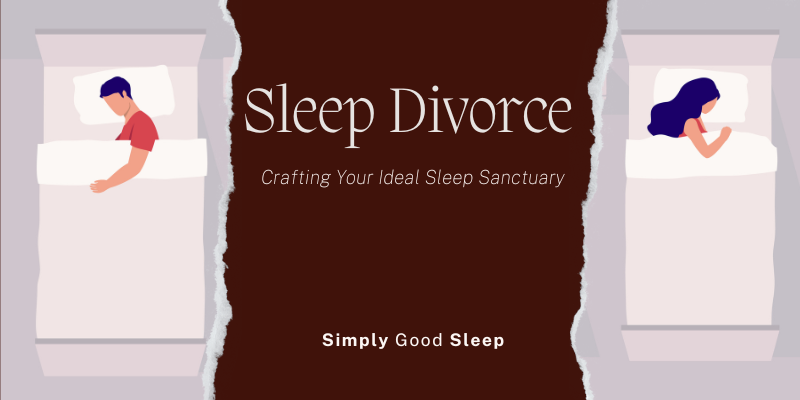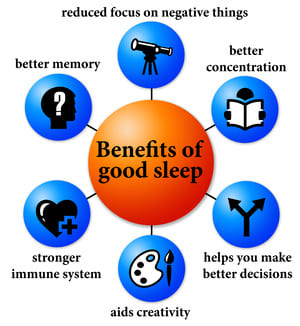
Tired of restless nights that leave you feeling groggy and irritable? Say hello to “sleep divorce,” a fresh take on bedtime that’s shaking up the norm. This game-changing idea is all about redefining sleep for a healthier, happier you. By giving individuals the freedom to prioritize their sleep needs, sleep divorce is fostering a new wave of self-care within relationships, paving the way for improved overall well-being.
Understanding Sleep Divorce
Picture this… sleep divorce isn’t about splitting up; it’s about getting the best sleep possible. It means having your own cozy sleep space, separate from your partner. It’s a nod to the importance of quality shut-eye for your body and your relationship.
By recognizing the significance of individual sleep preferences and requirements, sleep divorce promotes a more customized and restorative sleep experience, allowing partners to wake up refreshed and ready to tackle the day together.
Reasons for sleep divorce
Couples opt for a cessation of shared sleep for a multitude of reasons, ranging from issues like snoring, temperature differences, restless legs, insomnia, conflicting schedules, to a simple desire for personal space.
Additionally, differing chronotypes, where one partner is a night owl and the other a morning lark, can also contribute to the decision to pursue a sleep divorce.
In response, sleep divorce presents itself as a practical remedy, permitting individuals to seek solace through either sleeping in separate beds within the same room or occupying entirely separate rooms, based on their distinct requirements and inclinations.
How common is sleep divorce?
In recent years, the prevalence of sleep divorce has seen a notable increase, with a significant number of Americans opting for this arrangement to enhance their sleep quality.
Statistics suggest that various age groups engage in sleep divorce, with percentages ranging from 22% among baby boomers to 43% among millennials. This trend underscores a collective prioritization of sleep and a growing recognition of the importance of individual rest, prompting individuals to seek alternative sleep arrangements when necessary.
The Science of Better Sleep
Ever wondered how sleep affects your whole being? It’s not just about feeling refreshed; it’s about balancing your hormones, boosting your brainpower, and bolstering your immunity. With sleep divorce, you can unlock these amazing benefits for yourself.
Research demonstrates the intricate interplay between sufficient, undisturbed sleep and overall wellness, highlighting the essential role of quality sleep in maintaining physical vitality and cognitive sharpness.
By prioritizing sleep divorce, individuals can proactively invest in their long-term health and vitality, paving the way for a more energetic and fulfilling lifestyle.
Challenges of Shared Sleep Spaces
Sure, sharing a bed sounds romantic, but it can lead to all sorts of sleep struggles. From mismatched sleep schedules to arguing over mattress firmness, it can really mess with your sleep quality.
Sleep disturbances arising from shared sleep spaces can significantly impact partners’ sleep patterns, leading to daytime drowsiness and potential conflicts.
Acknowledging these challenges underscores the need for a personalized sleep approach that respects and accommodates each partner’s unique sleep preferences and habits.
Implementing Sleep Divorce for Enhanced Rest
Ready for a change? Embracing sleep divorce lets you create your dream sleep haven.
Make your own comfy corner, talk openly about your sleep preferences, and add some soothing rituals to create the perfect sleep atmosphere. Implementing sleep divorce involves proactive communication and the establishment of designated sleep spaces that cater to each partner’s specific comfort and relaxation needs.

By fostering an environment conducive to uninterrupted and rejuvenating sleep, individuals can create a sanctuary for rest and restoration, ensuring that bedtime becomes a tranquil and cherished part of their daily routine.
The Impact on Relationship Dynamics
Surprisingly, sleep divorce can actually bring you closer. By ensuring you both get the rest you need, you’ll wake up with a brighter mood and better communication skills. It’s a secret recipe for a stronger bond.
Sleep divorce encourages a mutual understanding and respect for each other’s sleep requirements, fostering a sense of empathy and consideration within the relationship.
With both partners waking up rejuvenated and ready to embrace the day, the potential for improved emotional connection and effective communication is heightened, laying the groundwork for a more harmonious and fulfilling partnership.
Navigating Stigma and Social Perceptions
Even though sleep divorce is catching on, some people still raise their eyebrows. Don’t worry, you can tackle the naysayers by talking openly, sharing the benefits, and showing how much more connected and rested you are.
Overcoming societal stigma and preconceived notions surrounding sleep divorce requires open dialogue and a proactive approach to dispelling myths and misconceptions.
By fostering an environment of open communication and education, individuals can advocate for the importance of personalized sleep practices while emphasizing the positive impact of sleep divorce on overall relationship satisfaction and well-being.
Long-term Effects and Lifestyle Changes
Making sleep divorce a part of your life means building healthy sleep habits. Stick to a routine, create a cozy sleep environment, and tackle any sleep hiccups early on to keep the good vibes flowing.
Sustaining the practice of sleep divorce involves the cultivation of enduring sleep hygiene practices and the establishment of consistent sleep routines that prioritize rest and relaxation.
By integrating these long-term lifestyle changes, individuals can safeguard their sleep quality and overall well-being, fostering a sustainable approach to maintaining a healthy and fulfilling lifestyle.
Promoting Mental Health and Emotional Well-being
Guess what? Better sleep isn’t just about physical health. It can also do wonders for your mood, helping you feel calmer, more balanced, and ready to take on the world.
Prioritizing better sleep through the practice of sleep divorce promotes emotional well-being and resilience, contributing to reduced stress levels and enhanced emotional regulation.
By nurturing a nurturing sleep environment that fosters deep, restorative sleep, individuals can experience an uplifted mood and a more positive outlook on life, empowering them to navigate daily challenges with a greater sense of emotional equilibrium and mental fortitude.

Challenges and Drawbacks
While sleep divorce has its perks, it’s not without its challenges. You might feel a bit alone at first, but with open communication and mutual respect, you can find your sweet spot.
Addressing the challenges and potential drawbacks of sleep divorce involves fostering open and honest communication with your partner and actively seeking solutions to potential feelings of isolation or disconnection.
By acknowledging and respecting each other’s emotional needs and concerns, couples can navigate the transitional phase of sleep divorce, finding a balance that fosters both individual well-being and relational harmony.
Looking Ahead
As the world changes, more and more people are recognizing the importance of putting their sleep first.
Sleep divorce might just become the new normal, a symbol of self-care and deepening relationships. The increasing awareness of the significance of sleep in promoting overall well-being and relationship satisfaction is likely to propel the concept of sleep divorce into the mainstream consciousness.
As societal norms continue to evolve, the acceptance and integration of sleep divorce as a symbol of prioritizing personal well-being within the context of intimate relationships are poised to redefine conventional notions of bedtime practices, fostering a culture of holistic self-care and emotional connectedness.
Conclusion
Ready to unlock a world of better sleep? Embracing sleep divorce isn’t just about catching more Zs; it’s about investing in a happier, healthier you and a more fulfilling connection with your loved one. So why not give it a go?
By prioritizing individual sleep needs and fostering an environment conducive to restful slumber, individuals can unlock a realm of physical, emotional, and psychological benefits, fostering a harmonious equilibrium between personal well-being and intimate relationships.
Embracing the transformative journey of sleep divorce signifies a conscious commitment to self-care and emotional fulfillment within the context of a shared partnership, setting the stage for a more vibrant and resilient connection rooted in mutual respect and unwavering support.

4 Responses
Sleep divorce is a term that I have never heard before. I knew some people sleep separately, but I’ve not heard it call that before. I’m in the baby boomer category of couples that still sleep together – I mean actually sleep together. 🙂 It’s definitely had challenges over the years. We now have a Sleep Number bed with different firmness settings. Snoring has been a big issue. Sleep divorce could be a good arrangement to get better sleep in those situations. Something to think about! – Scott
Scott, thank you for sharing your experience and thoughts! It’s great to hear that the concept of sleep divorce sparked your interest. While the term might be new to many, the practice of sleeping separately to enhance sleep quality is gaining traction, especially as people recognize the vital role sleep plays in overall health and well-being.
It sounds like you’ve already taken steps to address some common sleep challenges with your Sleep Number bed, which is fantastic. Tailoring mattress firmness to individual preferences is a significant move towards better sleep. Snoring, however, can still be a major hurdle, and this is where sleep divorce can be a game-changer.
The idea behind sleep divorce is to prioritize individual sleep needs, which can ultimately lead to better rest and improved mood, energy levels, and overall health. For couples dealing with snoring or other disruptions, having separate sleep spaces—whether that means separate beds in the same room or different rooms altogether—can make a world of difference.
Embracing sleep divorce doesn’t mean sacrificing intimacy or connection; in fact, many couples find that their relationship strengthens as both partners get the quality sleep they need. You can still enjoy bedtime routines and morning moments together, but with the added benefit of uninterrupted sleep.
If you ever feel the challenges of shared sleep becoming overwhelming, consider trying sleep divorce as a temporary or occasional solution. It might just be the key to a more restful and harmonious relationship. Thank you again for your insightful comment, and here’s to many more nights of peaceful, rejuvenating sleep!
Hello . I enjoyed reading this article , and the concept of sleep divorce introduces a refreshing perspective on prioritizing individual sleep needs within relationships, fostering a healthier approach to bedtime rituals. By recognizing and respecting each partner’s unique sleep preferences, this practice promotes better rest and enhances overall well-being, ultimately nurturing stronger and more harmonious connections. Well done.
Thank you, Ela, for your thoughtful feedback! We’re delighted that you found the concept of sleep divorce refreshing and insightful. It truly is a transformative approach to prioritizing individual sleep needs, fostering both personal well-being and stronger relationships. By creating personalized sleep environments, couples can enjoy better rest, leading to improved mood, energy, and communication.
Recognizing and respecting each partner’s unique sleep preferences can turn bedtime into a nurturing experience rather than a source of conflict. It’s heartening to see how embracing this practice can enhance harmony and connection. Thank you for appreciating the article and for your kind words. Here’s to happier, healthier sleep for everyone!